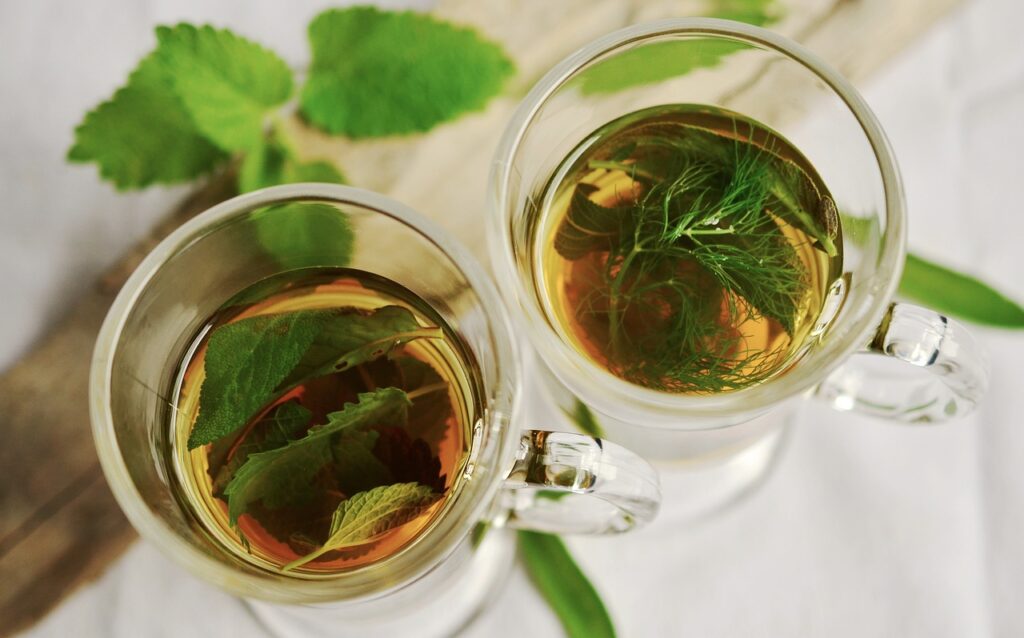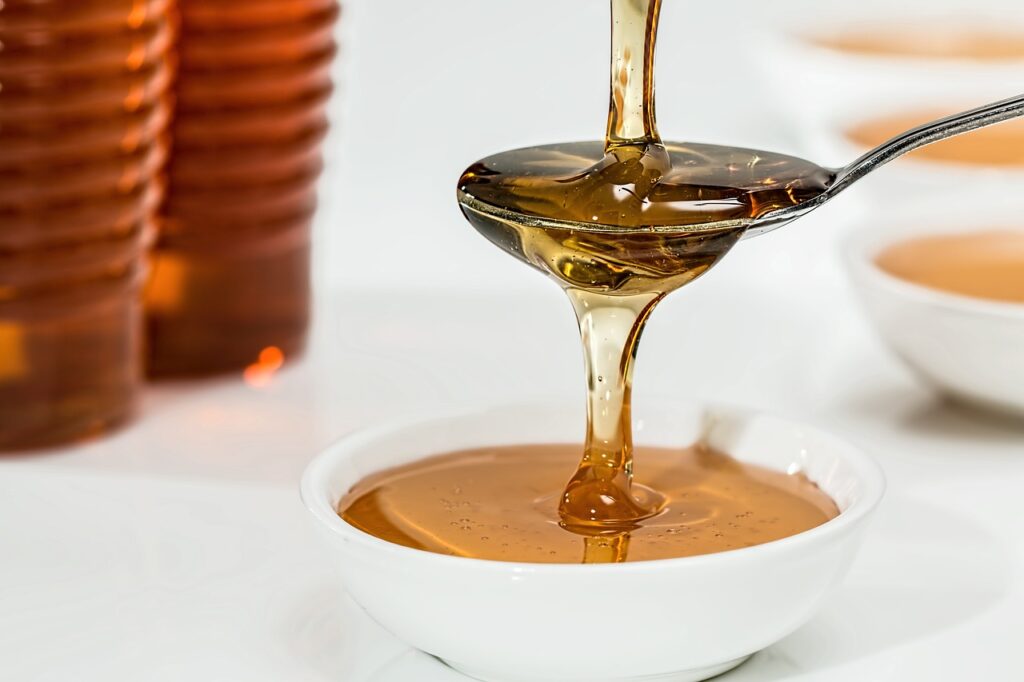Do you want to know what herbs are good for coughing? Perhaps you’ve been plagued by persistent coughing and want natural, herbal remedies to try at home.
Herbal supplements containing natural ingredients have been used as traditional treatments worldwide for centuries, and they’re becoming increasingly popular in modern-day medicine too.
In this blog post, we’ll discuss some of the most commonly recommended herbs for coughing and how to use them safely.
What Causes Cough?

A common sign of several illnesses and medical conditions is coughing. It’s the body’s way of removing anything that doesn’t belong in the lungs and clearing away irritants. But what could be causing your cough? Here, we will explore some of the most common causes of chronic coughing.
👉Asthma
Coughing is a key asthma symptom, especially with wheezing or difficulty breathing. As irritated airways swell and narrow due to inflammation, asthma develops and makes it harder for air to pass through.
👉Gastroesophageal Reflux Disease (GERD)
Stomach acid backing up into the esophagus causes GERD, a digestive ailment that causes burning. Coughing can indicate GERD if other symptoms like heartburn, chest pain, and difficulty swallowing accompany it.
👉Irritation From Pollutants or Smoke
Pollution and cigarette smoke are two of the most common causes of coughing because they contain hazardous particles that can irritate the lungs if inhaled frequently.
Even secondhand cigarette smoke can cause coughing when someone with sensitive lungs is exposed regularly.
👉Allergies
Allergens such as pollen or pet hair can trigger an allergic reaction in the body, leading to lung and throat inflammation – both of which are associated with coughing fits.
Allergic reactions are triggered when your immune system mistakes harmless substances for harmful invaders and releases antibodies to fight against them.
👉Bacterial Infections
Bacterial infections such as pneumonia or tuberculosis can also cause chronic coughs due to their ability to damage lung tissue and impair lung function if left untreated.
See a doctor immediately if you experience persistent coughing or chest pain or shortness of breath.
👉Viral Infections
Viral infections such as bronchitis or the flu can also lead to prolonged bouts of coughing due to their ability to weaken lung tissues and cause inflammation in the respiratory system over time if left untreated by medication prescribed by a doctor specializing in infectious diseases.
What Herbs Are Good for Coughing?

Now that we know what causes cough let’s look at some of the herbs that are good for coughing. These natural remedies can help soothe irritated airways and reduce lung inflammation to relieve persistent coughing.
🌿Peppermint
Menthol, a naturally occurring anti-inflammatory compound found in peppermint, may help to lessen throat discomfort. In addition, peppermint also has antimicrobial properties that can help to fight off bacteria and viruses in your respiratory system. It’s easy to make peppermint tea or add a few drops of peppermint essential oil to hot water and sip throughout the day.
🌿Marshmallow Root
This herb contains mucilage, which helps to coat your throat and reduce irritation from coughing. Moreover, marshmallow root contains anti-inflammatory elements that may assist to lessen irritation in the airways produced by infections or allergies. You can make marshmallow root tea by adding a teaspoon of dried marshmallow root into boiling water.
🌿Turmeric
It is a common herb used to treat coughs and colds. It comprises curcumin, an anti-inflammatory compound that eases coughing by reducing lung and throat inflammation. Additionally, turmeric has been found to have antimicrobial properties that can help fight off bacteria or viruses that may be causing your cough.
🌿Demulcents
Demulcents are herbs that contain mucilage—a sticky substance that coats the throat and helps relieve irritation caused by coughing. Some examples of demulcent herbs include cherry bark, slippery elm bark, linden flower, marshmallow root, licorice root, and mullein leaf. These herbs are typically taken as tea or syrup to soothe the throat and relieve coughing.
🌿Cherry Bark & Linden
Cherry bark is known to be effective in relieving persistent chest congestion due to its expectorant properties. It helps loosen phlegm buildup so you can expel them much easier when coughing or sneezing. Similarly, linden has antispasmodic properties which help relax tight chest muscles associated with coughing fits caused by colds or allergies. Both cherry bark and linden are available in tea form from health food stores; simply follow the package instructions to make yourself a cup whenever you need relief from coughing fits caused by a cold or allergies.
🌿Slippery Elm Bark
It is an herb native to North America and is often used as an herbal remedy for coughs due to its high mucilage content. Slippery Elm Bark is known for its ability to soothe the throat and reduce irritation caused by coughing. You can make slippery elm bark tea by boiling two teaspoons of dried bark in two cups of water until the liquid thickens slightly (about 10 minutes).
🌿Ginger
The anti-nausea properties of ginger are well known. Still, it’s also useful for treating coughs because it contains compounds like gingerol and shogaol, which have anti-inflammatory properties that can help to reduce inflammation in your airways caused by allergies or bacterial infections. Ginger tea is easy to make; just add a teaspoon of freshly grated ginger into boiling water and steep for 5 minutes before straining and drinking the tea warm.
🌿Ivy leaf
It has been an herbal remedy since ancient times due to its expectorant properties, which help loosen mucus from your chest so you can expel it more easily when you cough. Ivy leaf also has antispasmodic qualities, which help relax tightened muscles in your chest, making it easier for you to breathe when coughing or wheezing occurs due to asthma or bronchitis. To make ivy leaf tea, simply boil two teaspoons of dried leaves in two cups of water until reduced by half (about 15 minutes).
🌿Thyme
Thyme has antibacterial and expectorant properties, which help loosen mucus from your chest so you can expel it more easily when coughing up phlegm or sputum associated with bronchitis or other respiratory infections like pneumonia. To make thyme tea, pour one cup of boiling water over one teaspoon of fresh thyme leaves (or one tablespoon of dried thyme), then let steep covered for 10 minutes before straining out the leaves and drinking the tea warm while it’s still fresh!
🌿Aniseed
Aniseed has expectorant qualities that help loosen mucus from your chest when coughing up phlegm associated with bronchitis or other respiratory infections such as pneumonia. Aniseed also acts as an antispasmodic which helps relax tightened muscles in your chest, making it easier for you to breathe when wheezing occurs due to asthma or other conditions affecting respiration like COPD (Chronic Obstructive Pulmonary Disease). To make aniseed tea, boil one teaspoon of crushed seeds in one cup of water until reduced by half (about 10 minutes).
🌿Licorice Root
Licorice root works similarly to Slippery Elm Bark but offers additional benefits, including soothing irritated membranes in your throat caused by allergies or viral infections such as colds & flu, plus reducing swelling inside nasal & sinus cavities resulting from hay fever allergies & sinusitis, allowing better airflow through nasal & sinus passages improving breathing & alleviating congestion during cold/flu season! To make licorice root tea, simmer one teaspoon of crushed roots per cup of boiling water until reduced by half (about 10 minutes).
These are some common herbal remedies for treating coughs and other respiratory problems.
Other Home Remedies for Cough to Try at Home

Aside from the herbal remedies mentioned above, there are a few other home remedies that you can try at home.
👉Honey
Honey is an age-old remedy for soothing sore throats, and calming coughing fits. Drinking honey gently daily while combining it with warm water or hot tea is the best method to ingest it. Not only does honey work as an anti-inflammatory agent, but it is also full of antioxidants that can help boost your immune system and aid overall health.
👉Hot Fluids
Hot fluids such as soups, herbal teas, and broths can help thin out mucus and make coughing more bearable. Plus, they will keep you hydrated and provide some essential nutrients to help reduce inflammation in your throat and airways.
👉Probiotics
Many people may not be aware that probiotics can be quite helpful in fighting off the common cold or flu viruses that cause coughing fits in the first place! Probiotics contain healthy bacteria that can strengthen your immune system and even fight off congestion due to allergies or asthma-related issues. Try adding some probiotic-rich foods such as yogurt or kimchi into your diet each day for extra strength against infection-causing agents like viruses and bacteria!
👉Steam
Breathing in the steam from hot showers or boiling water helps loosen up mucus stuck in the chest area, making it easier to expel through coughing fits. This method is especially helpful for those who suffer from chronic bronchitis or asthma-related issues since steam inhalation opens up their airways so they can breathe more easily again!
👉Elderberry Syrup/Tea/Gummies/Extracts
Elderberry has been used historically as an antiviral agent due to its many healing properties, such as boosting immunity, reducing inflammation, and stimulating circulation throughout the body (which helps speed up recovery!). Try making some elderberry syrup at home with fresh or dried elderberries mixed with honey for added benefits—just make sure you follow all safety instructions when handling raw elderberries! You can also find pre-made elderberry tea bags or gummies if you don’t have time to make your syrup!
👉Bromelain
Bromelain is an enzyme found in pineapples that has anti-inflammatory properties. It breaks down proteins that cause inflammation, making it an effective natural remedy for sore throats associated with colds and flu. Consume 500 mg of bromelain twice on an empty stomach to treat coughs.
👉Menthol
Menthol has been used as a cough suppressant for centuries thanks to its soothing effect on sore throat muscles. You can find menthol in many over-the-counter medications, such as lozenges, gargles, and chest rubs. Just take it as directed by the dosing guidelines on the box.
👉N-Acetylcysteine (NAC)
NAC is a powerful antioxidant that helps reduce lung inflammation and mucus production. This makes it particularly helpful if your cough is due to bronchitis or other lung-related issues. In addition to oral supplementation, you can inhale NAC directly from a nebulizer or steam inhaler for fast relief from chest congestion due to colds or allergies.
👉Neti Pot
Neti pots are small containers that flush out nasal passages with a warm saltwater solution. Not only does this help clear any blockages caused by thick mucus buildup, but it also helps thin out excess mucus, so it’s easier to expel through coughing or sneezing. Plus, using a neti pot regularly can also help prevent future bouts of coughing by keeping your nasal passages free of allergens and irritants.
👉Humidifier
If your coughing fits are caused by dry air in your home, then using a humidifier may help relieve them quickly. Humidifiers add moisture back into the air, which helps soothe irritated throat membranes and loosen thick mucus buildup in the lungs and sinuses – both of which can cause persistent coughing fits if left untreated. For best results, place your humidifier near where you sleep to maximize your benefit while sleeping at night.
👉Essential Oils
Essential oils have long been used as natural remedies for coughs due to their antiviral and antibacterial properties, which help fight off infection and reduce inflammation in the throat area – two things that often lead to chronic coughing fits if left untreated over time. Some of the most effective essential oils for treating coughs include eucalyptus oil, peppermint oil, lavender oil, lemon oil, frankincense oil, oregano oil, and thyme oil. All of these have been shown to bring fast relief from the discomfort associated with persistent coughing fits without any side effects.
How to Prevent Cough
Since coughing is a natural reflex to clear the airways and expel any allergens, irritants, or pathogens from the respiratory system. It’s essential to address potential triggers to prevent future episodes.
1: Stay Hydrated
Consuming a lot of liquids keeps your throat’s mucous membranes hydrated and reduces irritation, which can stop you from coughing. At least 8 glasses of fresh water must be consumed each day.
2: Avoid Smoke
Smoke from tobacco products is a cough-inducing irritant that can exacerbate the throat. Thus, you should consider quitting or reducing smoking.
3: Avoid Pollutants
Polluted air contains particles such as dust, mold, and other allergens that irritate the respiratory system and cause coughing fits. Stay indoors when air quality levels are low, and wear a mask outside if necessary.
4: Take Supplements
Certain vitamins, minerals, and herbs may help reduce inflammation in the respiratory system and alleviate symptoms such as coughing fits. Consider taking a supplement containing vitamin C, zinc, echinacea, or ginger extract if you suffer from frequent coughs.
5: Practice Good Hygiene
Bacteria and viruses spread easily through hand-to-hand contact. So it’s essential to wash your hands frequently with soap and water or use an alcohol-based hand sanitizer when you’re out in public areas where germs are more likely to spread rapidly from person to person.
6: Get Plenty of Rest
Your immune system will be weakened by sleep deprivation, making it more difficult for the body to resist infections that might lead to coughing fits. For the best of health, attempt to get a minimum of 7-8 hours of rest every night.
7: Eat Healthy Foods
Consuming antioxidant-rich foods like vegetables and fruits helps build immunity and wards off colds that might cause coughing. Walnuts and Salmon, two foods high in omega-3 fatty acids, also aid in improving breathing by reducing airway inflammation.
8: Avoid Spicy Foods
Spicy foods like chili peppers contain compounds called capsaicin. It irritates mucous membranes causing them to produce excess mucus and leading to coughs. You should avoid consuming too many spicy foods, especially if you have a sore throat or chest congestion, as this will only worsen the situation further.
9: Exercise Regularly
Regular exercise strengthens your immune system making it better able to fight off colds which could lead to coughing fits. Aim for 30 minutes of moderate exercise 3-5 times per week, including activities like walking, swimming, biking, jogging, etc.
10: Get Vaccinated
Several vaccines available can help prevent the spread of certain illnesses, including influenza (flu).
11: Disinfect Surfaces
After getting in touch with a sick person, bacteria and viruses can continue to live on surfaces for hrs or perhaps days. To reduce the risk of spreading germs, routinely disinfect surfaces such as doorknobs, countertops, and faucets with a household cleaner with at least 70% alcohol content.
12: Avoid Dairy Products
Dairy products produce mucus in the body, which can worsen coughing. Try eliminating dairy products while you cough to see if it helps reduce symptoms.
Following these tips can help reduce your risk of developing a coughing fit and keep your respiratory system healthy. 3
Frequently Asked Questions
What alleviates a cough quickly?
The cause determines the fastest method of treating a cough. If you are coughing due to allergies or asthma, over-the-counter medications may relieve you. If your cough is due to an infection, such as bronchitis or pneumonia, antibiotics may be prescribed by your doctor. In either case, rest and plenty of fluids are essential for treating any cough.
Which foods can I eat if I have a cough?
Eating foods such as lean proteins (like chicken or fish), whole grains (like oatmeal or quinoa), fruits (such as berries), and vegetables (like broccoli or carrots). These can help boost your immune system and provide essential nutrients that may help reduce inflammation in the respiratory system which can help ease coughing symptoms. Additionally, drinking warm beverages like tea with honey may help soothe the throat and reduce inflammation in the airways.
What home remedy for phlegm is the most effective?
Several home remedies may help reduce phlegm production and ease chest congestion associated with coughing. Drinking hot liquids like herbal teas or warm water with lemon can thin mucus secretions in your lungs and make them easier to expel from your body when coughing.
Additionally, adding garlic or ginger into soups or stews can help break up mucus so it can be expelled more easily from your lungs. Steam inhalation techniques using essential oils such as eucalyptus oil may also help clear out excess mucus in your airways. Allowing you to breathe easier when dealing with phlegm-related coughing episodes.
What drink is good for coughing?
While water remains one of the best choices for hydration while dealing with a cough, other drinks may also offer additional benefits! Warm drinks such as chamomile tea with honey can soothe an irritated throat. While providing anti-inflammatory properties that could reduce swelling in the airways. It reduces episodes associated with coughing fits.
Additionally, fresh fruit juices such as orange juice contain Vitamin C, which helps boost immunity levels. Thus helping fight against colds associated with bacterial infections, which could trigger bouts of excessive coughing fits if not treated properly!
Can a nighttime cough that lasts all day be curable?
Dry coughs at night can disrupt you and those around you trying to sleep! To combat this issue, try using lozenges prior to bedtime, which could lubricate your throat. Thus reducing irritation caused by dryness leading up to nighttime hours, where episodes associated with hacking tend to be more frequent due to a lack of environmental stimuli keeping one alert during daytime hours.
Additionally, using humidifiers during winter months when indoor air tends to be drier than usual could help provide additional moisture, thus reducing the chances of experiencing dryness within the throat area, potentially leading to less intense episodes related directly to dryness associated with hacking fits.
Final Words
So what herbs are good for coughing? From chamomile and peppermint to elderberry and garlic, various herbs are available to treat chronic or severe cough. Adding these medicinal plants to your daily diet or using them in teas may relieve the annoying symptoms associated with coughing. If you suffer from a nagging or bothersome cough. Consider incorporating some of these natural remedies into your routine for positive results.

